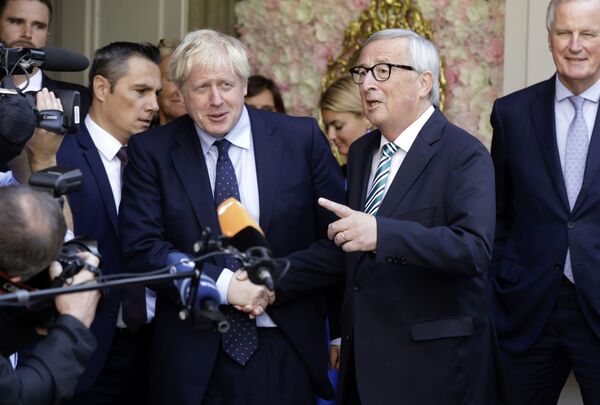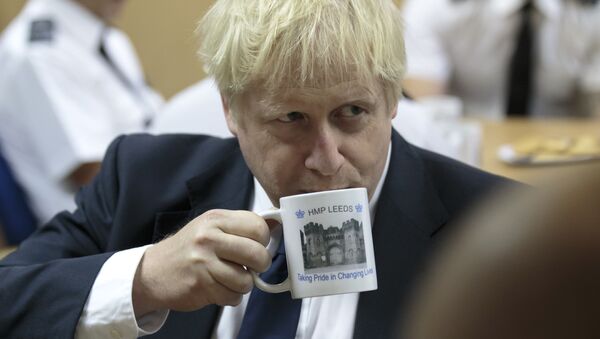The UK PM held talks with Juncker in Luxembourg earlier this week, and over the phone on Wednesday, after which Johnson's office released a statement saying that: "The Prime Minister and President Juncker discussed the positive and constructive conversation they had in Luxembourg on Monday and their shared determination to reach a deal".
The Irish backstop remains the primary stumbling block. Johnson wants it to be dropped from the deal, while the EU wants to keep it as an insurance policy in UK-EU Brexit negotiations to guarantee there is no hard border between the Northern Ireland and the Republic of Ireland, an EU member state.
The British prime minister has also been given less than two weeks, until 30 September, to come up with a plan to replace the Irish backstop.
Finland's Prime Minister Antti Rinne has said that he and French President Emmanuel Macron agreed that "it is now time for Boris Johnson to produce his own proposals in writing – if they exist. If no proposals are received by the end of September, then it's over".
Johnson has insisted that Britain will leave the EU on 31 October, whether or not a deal has been agreed, but Richard Fitzwilliams, royal commentator and public relations consultant has said it would mean violating the law:
"This is in contravention of a recent Parliamentary vote which is legally binding and which forces him to ask for a delay to Brexit until the end of January 2020 if Parliament has not approved a deal with the EU before 19 October. The EU would have to agree to this".
Last week, the UK Parliament passed into law a measure designed to block the possibility of an abrupt, no-deal exit on 31 October. If no new deal with the EU is agreed, Parliament can enforce a three-month Brexit extension.

It's been a hard week for Johnson who's not just been facing criticism from the EU; in London, it's the final day of a Supreme Court hearing on a case regarding the suspension of Parliament.
The British PM, who prorogued Parliament for five weeks until mid-October, has been accused of trying to stop the lawmakers from scrutinising his Brexit plans.
Johnson maintains that he had the right to suspend Parliament to present the Queen's Speech on 14 October.
Mr Fitzwilliams noted that while there have been historical precedents for suspending Parliament; and it regularly happens for a few working days before a Queen's Speech, this time the circumstances are different:
"This shortens the time for a debate, and the situation is unique because there is no precedent for Brexit. The Queen gave her assent, as she acts on the advice of the Prime Minister, and no monarch had refused such a request since Queen Anne in 1708. The High Court in England has ruled that this was legal; in Scotland, appeal court judges have ruled that this was illegal, so the Supreme Court will decide. They will rule on whether Johnson was justified in suspending Parliament. The pivotal question also is, did the Prime Minister mislead the Queen in requesting prorogation?"
The Supreme Court will decide and deliver the final verdict on the prorogation of Parliament after the Scottish court found the suspension to be "unlawful", with an English court calling the matter a political one and not a legal one.
"If the Court rules the suspension is legal he will claim a victory, but the vote will still bind him in Parliament, ruling out no-deal", the royal commentator said.

"If the court rules the suspension is illegal, Johnson would almost certainly be forced to lift it and allow Parliament to sit. It will also be a personal humiliation; he has already lost all six parliamentary votes since he took office as Prime Minister, and has been unable to call a General Election as he wished, because of the provisions in the Fixed Term Parliaments Act of 2011*", Mr Fitzwilliams added.
For her part, former Brexit Party MEP Diane James believes that the legal challenge against Boris Johnson's decision to suspend Parliament could be successful:
"I think it could win, and the reason I say that is because there is a background here to stop the UK leaving the EU at any cost, and we are now into what we call 'scraping the barrel territory', and the Remainers are using effectively their last mechanism. They've put a lot of effort into this, I'm sure they've done a lot of pre-investigative work, and I think that there's a very good chance that they will win".
As to whether the UK will leave the EU on 31 October, James explained that it all depends on the Supreme Court's decision:
"If parliament is recalled; then the likes of Dominic Grieve [Tory MP expelled by Johnson] and the others will ensure that no-deal is stopped in any way or form, and of course, that's exactly what Boris Johnson does not want to happen".
The politician also stressed that if the UK doesn't leave the EU on 31 October, then Boris Johnson's career as prime minister and as a political figure is "all over".
*The Fixed Term Parliaments Act of 2011 creates a five year period between general elections, but an early election can be held if a two-thirds majority of the House of Commons votes for it, or if MP's back a vote of no confidence in the sitting government, with no vote of confidence in the government to follow within 14 days.



